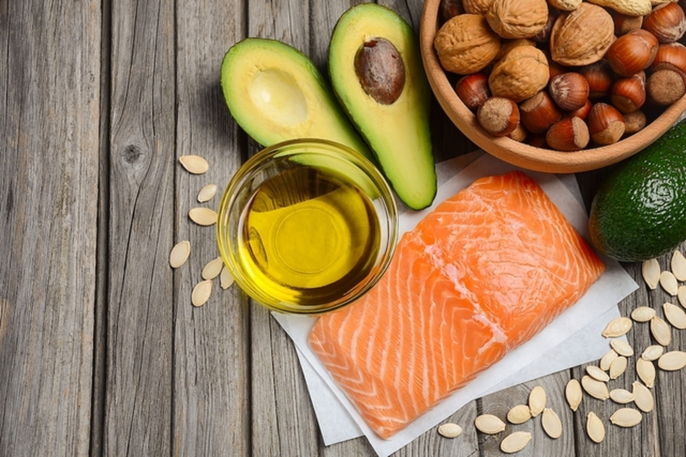An arthritis diet should be rich in foods that contain anti-inflammatory properties (like fish and nuts) and are high in vitamin C.
Excess weight can also overload the joints, which is why it is important to manage weight through a healthy diet. This can help to improve symptoms and prevent worsening of the disease.
Arthritis is a chronic inflammatory disease that causes pain in many joints of the body. It can occur at any age, although it is more common in older adults. These joint changes are not curable, although patients can manage their symptoms and prevent complications by adhering to treatment prescribed by their doctor, as well as diet changes and regular exercise.

What to eat
Foods that contain anti-inflammatory properties will help to improve symptoms of arthritis. Examples include:
- Omega-3 foods, which contain anti-inflammatory properties. These include tuna, sardines, trout, tillapia, herring, anchovies, cod, chia seeds, flaxseeds, cashews, Brazilian nuts, peanuts and walnuts. Read more about other omega-3 foods you can include in your diet.
- Garlic and onion, which contain a sulfurous compound called allicin. This substance provides anti-inflammatory, antioxidant and antimicrobial action.
- Citrus fruits, like oranges, pineapple and cherries, due to their presence of vitamin C (which is necessary for collagen production)
- High-fiber foods, like vegetables, fruits and whole grains, which reduce inflammation and maintain optimal gut health. Check out a list of other high-fiber foods you can incorporate in your diet.
- Berries and red fruits, like pomegranate, watermelon, cherry, raspberries, strawberries and guava. These contain anthocyanins, which are antioxidant compounds that have anti-inflammatory properties.
- High-selenium foods, like eggs, French buns and Brazilian nuts. Selenium is a mineral with potent antioxidant and immunomodulator effects, which help to strengthen the immune system.
In addition, there are studies that suggest that both arthritis and osteoarthritis are very severe in people with low vitamin D levels. Therefore, it is important to be exposed to the sun frequently, and to include vitamin D foods in your diet, like fortified milk, eggs and fatty fish.
In some cases, a doctor or registered dietitian may recommend supplementation with omega-3, zinc, selenium, vitamin D and calcium if necessary. They may also indicate the use of glucosamine and condroitin, which are substances that form cartilage and help to improve joint damage caused by arthritis.
Foods to avoid
When maintaining an arthritis diet it is important to avoid foods that are pro-inflammatory, i.e. promote inflammation in the body, such as:
- Processed foods that are rich in sugars and fats, such as cakes, stuffed cookies, sauces in general, ice cream, sweets, lollipops
- Fried foods and snacks
- Alcoholic drinks
- Sausages, such as hotdogs, chorizo and ham
- Fast food
In addition, pre-cooked frozen foods such as nuggets, pizzas, breaded chicken, and lasagna should also be avoided.
Meal plan for arthritis
The following table outlines a sample 3-day meal plan with anti-inflammatory foods to treat arthritis:
The quantities outlined in this sample meal plan will vary depending on age, sex, activity level and health history. Therefore, it is important to consult a registered dietitian for a thorough assessment and more customized meal plan that meets your health goals.
A good reference diet for an anti-inflammatory meal plan is the Mediterranean diet. This diet focuses on consuming fresh foods that are within the season, as well as olive oil, seeds, walnuts, beans, fruits and vegetables. Learn more about the benefits of a mediterranean diet and which foods to eat.
Rheumatoid arthritis diet
A rheumatoid arthritis diet emphasizes the consumption of omega-3 foods and also prioritizes foods that strengthen the immune system. These foods should contain antioxidants and should be rich in vitamin A, vitamin C, vitamin E and selenium. Examples include:
- Fruits, especially oranges, cherries, lemons, guava, papaya and pineapple
- Greens and other veggies, especially cauliflower, tomato, broccoli, spinach, cabbage and carrots
- Milk and dairy products, like skim milk, fat-free yogurt, and white cheese (like ricotta and cottage cheeses)
Patients with rheumatoid arthritis should maintain an ideal weight, as being overweight can overload the joints and worsen pain. Excess body fat also promotes more inflammation which can worsen the illness.
Gout diet
Gout is another type of inflammatory arthritis that is triggered by the accumulation of uric acid. A gout diet should include anti-inflammatory foods, although it is also important to avoid foods that may increase uric acid concentration, like red meat, organ meats and alcohol. Read more about the gout diet and how it can help to manage related symptoms.






























